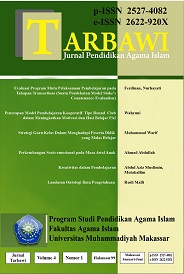Mapping Deep Learning Research in Digital Transformation of Islamic Religious Education: Bibliometric Analysis 2015-2024
DOI: https://doi.org/10.26618/jtw.v10i01.17803
Deep Learning, Digital Transformation, Islamic Religious Education, Bibliometrics, Educational Innovation
Abstract
This study aims to conduct a systematic mapping of deep learning research in the digital transformation of Islamic Religious Education (PAI) in the 2015-2024 period through bibliometric analysis. The research method used Publish or Perish to extract data from Google Scholar and VOSviewer for research network visualization. From 996 articles found, 89 articles were selected and analyzed comprehensively. The results showed a significant increase in publications related to deep learning and digital transformation in Islamic Education, with major contributions from eleven key researchers, including DS Dalimunthe with an article entitled “Transformation of Islamic Education” which received 150 citations. Analysis of the research network revealed close links between deep learning, the digital era, character education, and Islamic teacher education. The findings show that digital transformation plays an important role in designing innovative PAI teaching strategies, with deep learning having the potential to create a more personalized and adaptive learning experience. This study concludes that despite the increase in publications, specific studies on the interconnectedness of deep learning, digital transformation, and PAI are still limited, especially in the period 2023-2024. The implications of this research provide a conceptual framework for future research development in the integration of advanced technology with Islamic education while maintaining the essence of spiritual and moral values.
References
Abdi, Muhammad Iwan. 2021. “Integrasi Nilai-Nilai Pendidikan Karakter Dalam Pembelajaran Pendidikan Agama Islam Pada Sekolah Berbasis Boarding School Di Indonesia.” el-Buhuth: Borneo Journal of Islamic Studies: 257–76. doi:10.21093/el-buhuth.v3i2.4473.
Abdul Mun’im Amaly, Giantomi Muhammad, Muhammad Erihadiana, and Qiqi Yuliati Zaqiah. 2021. “Kecakapan Guru Pendidikan Agama Islam Dalam Mengoptimalkan Pembelajaran Berbasis Teknologi.” Jurnal Pendidikan Agama Islam Al-Thariqah 6(1): 88–104. doi:10.25299/al-thariqah.2021.vol6(1).6712.
Ahyani, E, and E M Dhuhani. 2024. “Transformasi Digital Dalam Manajemen Perkantoran Pendidikan: Sebuah Kajian Literatur.” … Dibidang Administrasi Pendidikan. https://e-journal.undikma.ac.id/index.php/visionary/article/view/10785.
Al-Shabandar, R., Hussain, A., Laws, A., Keight, R., Lunn, J., & Radi, N. (2017, May). Machine learning approaches to predict learning outcomes in Massive open online courses. In 2017 International joint conference on neural networks (IJCNN) (pp. 713-720). IEEE.
Arifin, Z., & Hakim, L. (2023). Adaptive learning systems based on deep neural networks for Islamic education: A conceptual framework. International Journal of Islamic Educational Technology, 5(2), 214-232.
Asadullah, M. A., Karim, K. E., & Islam, M. S. (2024). Digital transformation of religious education: Balancing tradition and innovation in Muslim-majority countries. Comparative Education Review, 68(1), 78-96.
Dalimunthe, Dewi Shara. 2023. “Transformasi Pendidikan Agama Islam: Memperkuat Nilai-Nilai Spiritual, Etika, Dan Pemahaman Keislaman Dalam Konteks Modern.” Al-Murabbi: Jurnal Pendidikan Islam 1(1): 75–96. doi:10.62086/al-murabbi.v1i1.426.
Donthu, N., Kumar, S., Mukherjee, D., Pandey, N., & Lim, W. M. (2021). How to conduct a bibliometric analysis: An overview and guidelines. Journal of Business Research, 133, 285-296.
Huda, M., & Wekke, I. S. (2022). Integration of artificial intelligence in Islamic education: Opportunities and challenges. International Journal of Educational Technology in Higher Education, 19(1), 1-18.
Khoir, Najibul. 2019. “Literasi Pendidikan Agama Islam Siswa Sma Khadijah Surabaya Pada Era Revolusi Industri 4.0.” Universitas Islam Negeri Sunan Ampel Surabaya: 1–161. http://digilib.uinsa.ac.id/id/eprint/38643.
Kisno, Kisno, Nia Fatmawati, Revina Rizqiyani, Siti Kurniasih, and Eka Mei Ratnasari. 2023. “Pemanfaatan Teknologi Artificial Intelligences (Ai) Sebagai Respon Positif Mahasiswa Piaud Dalam Kreativitas Pembelajaran Dan Transformasi Digital.” IJIGAEd: Indonesian Journal of Islamic Golden Age Education 4(1): 44. doi:10.32332/ijigaed.v4i1.7878.
Lubis, M. A., & Rahman, A. (2021). Technological pedagogical content knowledge in Islamic education: A systematic review. Contemporary Educational Technology, 13(3), 307-321.
M. Dzikrul Hakim AL Ghozali, Nashiha Assakina. 2024.Implementasi Model Multiple Intelligence Pada Pembelajaran Ilmu Hadits di Kelas X MAN 4 Jombang. TARBAWI : Jurnal Pendidikan Agama Islam 09(01): 1–13
Mardiyah, Meiga Isyatan. 2020. Universitas Islam Indonesia Implementasi Deep Learning Untuk Image Classification Menggunakan Algoritma Convolutional Neural Network (CNN) Pada Citra Kebun Dan Sawah. dspace.uii.ac.id. doi:10.13140/RG.2.2.10880.53768.
Masruri, A., & Fauzi, M. A. (2021). Integrating technology in Islamic religious education: A systematic literature review. Journal of Education and Religious Studies, 12(2), 178-192.
Naenggola Devis, Noperta, Albertos Damni. 2024. Studi Korelasi Chatgpt terhadap Prestasi Akademik Mahasiswa Pendidikan Agama Islam. TARBAWI : Jurnal Pendidikan Agama Islam 09(02): 147–58
Rahman, F., Ishak, W. H. W., & Adesina, S. (2023). Deep learning for personalized Islamic education: A comprehensive review and future research directions. Education and Information Technologies, 28(7), 9245-9268.
Rahmawati, Fitri. 2018. “Kecenderungan Pergeseran Pendidikan Agama Islam Di Indonesia Pada Era Disrupsi.” TADRIS: Jurnal Pendidikan Islam 13(2). doi:10.19105/tjpi.v13i2.1752.
Raup, Abdul, Wawan Ridwan, Yayah Khoeriyah, Supiana Supiana, and Qiqi Yuliati Zaqiah. 2022. “Deep Learning Dan Penerapannya Dalam Pembelajaran.” JIIP - Jurnal Ilmiah Ilmu Pendidikan 5(9): 3258–67. doi:10.54371/jiip.v5i9.805.
Safitri, Tulaihah Ning. 2020. “Potensi Santri Dalam Transformasi Digital Literacy Memasuki Era Revolusi Industri 4.0 Di Pondok Pesantren Modern.” Mozaic : Islam Nusantara 6(2): 191–211. doi:10.47776/mozaic.v6i2.153.
Salleh, S. M., Hashim, H., & Abdullah, M. (2022). The integration of deep learning in Islamic Education: Perspectives from educators and students. International Journal of Academic Research in Progressive Education and Development, 11(1), 876-889.
Zidny, R., Sjöström, J., & Eilks, I. (2024). Educational research as a catalyst for sustainable development in Muslim-majority countries: A bibliometric analysis. Journal of Research in Science Teaching, 61(2), 180-201.
Downloads
Published
Issue
Section
License
Dalam hal artikel diterima oleh Tim Editorial TARBAWI: Jurnal Pendidikan Agama Islam, dengan nomor terdaftar ISSN 2527-4082 (Cetak), ISSN 2622-920X (Online) dan ada keputusan untuk menerbitkan artikel, hak cipta dari artikel dipegang oleh penulis.
Prodi Pendidikan Agama Islam, Fakultas Agama Islam, Universitas Muhammadiyah Makassar sebagai penerbit TARBAWI: Jurnal Pendidikan Agama Islam memegang hak publikasi semua artikel yang diterbitkan dalam jurnal ini.
Prodi Pendidikan Agama Islam, Fakultas Agama Islam, Universitas Muhammadiyah Makassar sebagai penerbit TARBAWI: Jurnal Pendidikan Agama Islam, dengan nomor terdaftar ISSN 2527-4082 (Cetak), ISSN 2622-920X (Online) memiliki hak untuk mereproduksi dan mendistribusikan artikel dan penulis tidak diizinkan untuk menerbitkan artikel yang sama yang diterbitkan dalam jurnal ini.
Pernyataan Keaslian dan Naskah Hak Cipta dapat diunduh: di sini
Setelah mengisi surat pernyataan, silakan kirim via email: jurnaltarbawipai@gmail.com


















